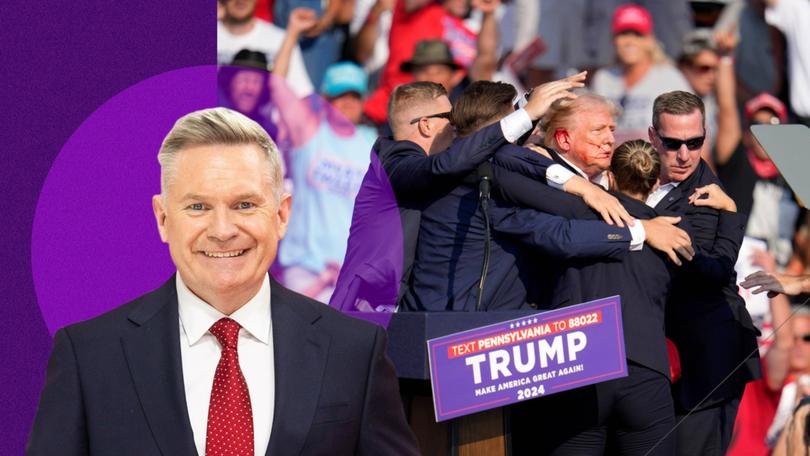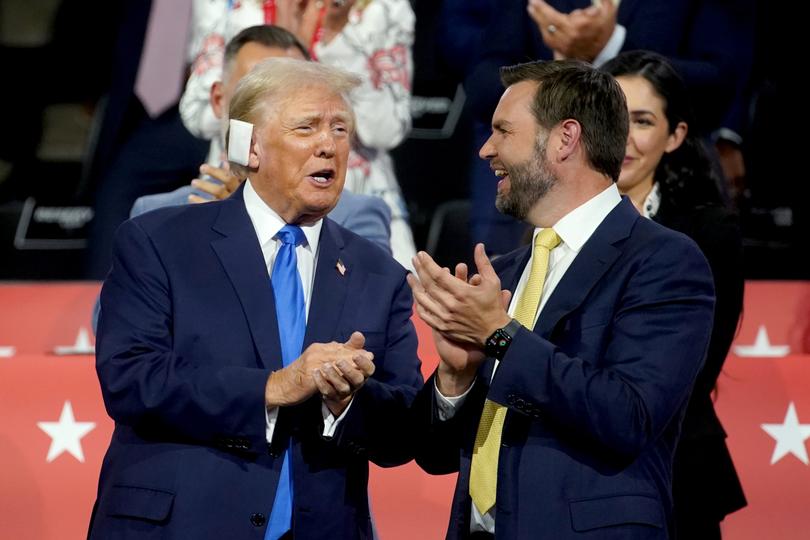MICHAEL USHER: Why this is the wrong time to be ‘lowering the temperature’ in public debate
MICHAEL USHER: There’s nothing wrong with a shouty argument about two differing opinions. That’s what makes many family gatherings far more interesting, and Parliament actually engaging.

I’ve been stewing on some of rhetoric and outright silly things that have been said in the aftermath of Donald Trump being shot.
One thing I can’t reason is this whole appeal for calm in public debate. The posturing of some proclaiming: “let’s tone it down, dial it back, celebrate different opinions”.
Yes, that’s worthy. Yes, it’s needed. So why is it annoying me? Perhaps it’s the people who are saying it? Or the way they’re saying it.
Sign up to The Nightly's newsletters.
Get the first look at the digital newspaper, curated daily stories and breaking headlines delivered to your inbox.
By continuing you agree to our Terms and Privacy Policy.With some of them, it’s as if they relish rushing to the pulpit in these events. “Look at the horrible mess down there and look at me up here all worthy and above it all.” It’s all a bit preachy, or perhaps it’s just downright cynical.
The Prime Minister on Sunday held a very prime ministerial press conference at Parliament House with the blue curtain and flags. His message was right, but also wrong, in my view.
While expressing his relief that Trump wasn’t killed, Mr Albanese went on: “We must lower the temperature of debate. There is nothing to be served by some of the escalation of rhetoric.”
Now I think this is where I’m getting stuck. Those words are completely at odds with the actions of our politicians.

Have you seen what they say and do in question time in Parliament: the name-calling, shouting and borderline bullying?
Does the PM think we forgot about the time he called Peter Dutton a boofhead?
Do political leaders think we forget about super-charged slogans and personal attacks during an election? Or the often unseen and unreported escalation of rhetoric from faceless political staff who openly berate reporters when words are written that may be unkind to their leaders?
Look I get it, our leaders at every level rush to the worthy platforms in crisis, and adopt the calm voice to deliver measured statements about “lowering the temperature”. But very quickly they’re lowered back into the swamp.
Why do we need to lower the temperature in public debate? It’s an honest question.
Aren’t some subjects or policies or alternatives crying out for strong, loud, clear debate and opinions?
There’s nothing wrong with a shouty argument about two differing opinions — that’s what makes many family gatherings far more interesting, and Parliament actually engaging.
What gets changed with lowered temperatures?
Surely tepid or lukewarm discussion is the stuff that keeps every rank of the public service humming along in endless Teams meetings and email loops that slosh around with little being decided but everyone feeling like they’ve been productive.
I would argue this is exactly the wrong time to be lowering the temperature.
Not while the middle class is being sucked dry to the point of dehydration, the poor shoved further down the drain, and the rich are thriving with record wealth.

Isn’t this the time to put the blowtorch to the belly of our decision-makers? Surely turning up the heat makes a few important people sweat and shift their position.
Now, I’m sure our Prime Minister and every other world leader who echoed the same “tone it down” speeches in the wake of Trump’s failed assassination were really trying to say: “Trump’s hate speech almost got him killed so let’s not go down that path.”.
But it’s not as simple as that.
Toning down public debate, could well mute serious discussions about necessary change. It could make people scared to raise hot topics.
Lowered temperatures of public discussion could be equivalent to a librarian’s stern shush to any loud conversation that might well raise serious counterpoints to wrongs or mistruths. None of which is wise in the times.
Heated debate can be had. Heated civil debate can be had. Differences of opinion are possible without inciting riot. And I think this is what the politicians are trying to say.
We don’t have to go all kumbaya but back off with the lava-strength rhetoric that makes someone want to shoot you — or shoot someone else.
However, those politicians aren’t exactly leading by example, away from their feel-good post-traumatic event press conferences, but what they’re trying to say is that perhaps Trump’s very lucky near miss might re-set the way we engage in debate.
I’m in the camp that says Trump won’t radically move away from his emotive statements but I guess we’ll find that out at the Republican National Convention.
But his style is not to debate anyway. It’s to posture and intimidate. To draw opponents in and drag them down to his position where he knows how to fight. And he’s very good at it.
But if you took the advice of our PM and other leaders, you just don’t engage Trump-like populist figures. You let them be and have polite conversations around them.
Well, frankly, that’s not working out very well.
Australia may well one day have its own Donald Trump — someone who bucks the conventions and captures wild public support of the people fed up with the political parties and the lobbyists who’ve infiltrated them.
One of those political parties will buckle, re-write their own rules and allow Aussie Trump to lead because they’ll do whatever it takes to win power.
Lowered temperatures in public debate and calm rhetoric are not how you stop that happening.
Feel-good panel discussions among academics and experts aren’t the solution either. They’re nice, and make their guests feel smart, but they don’t head off threats or lead to any change in government policy.
Debate doesn’t have to be red hot, but nor can it afford to be a gentle simmer. You can disagree and walk away unbruised. A loud point might make some think about change.
So let’s not go into all this too quietly. We don’t all have to agree. But we don’t have to disagree to the point of violent plots.
More importantly, let’s not let good, robust debate, rhetoric and opinion be muted or turned down here in Australia just because guns and God and right and wrong and truth and lies have been so badly boiled in one, burned pot in the United States.
